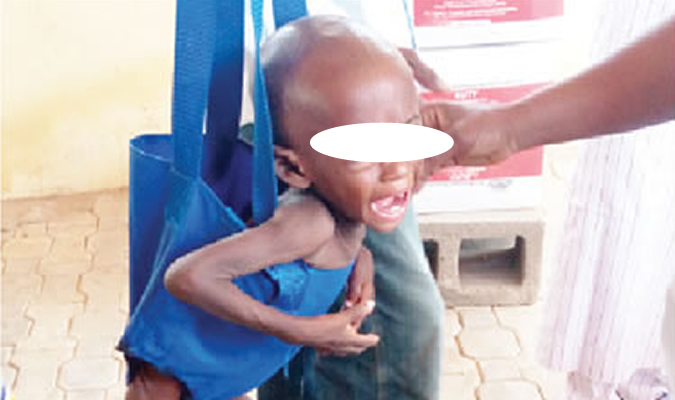[ad_1]

A registered dietician-nutritionist at the Alex Ekwueme Federal University Teaching Hospital, Nwabumma Asouzu, says malnutrition has hidden dangerous impacts on the well-being and survival of children.
Besides making children more susceptible to diseases and infections, the nutrition expert said malnutrition slows wound healing and delays the recovery of children suffering from infections.
Asouzu stated this during an interview with PUNCH HealthWise.
She warned against ignoring the consequences of malnutrition in children as a statement by the United Nations agencies affirmed that Nigeria and 14 other countries were home to 30 million malnourished children.
According to the dietician, malnutrition is a serious public health problem and leads to stunting in children, stressing that stunting is a major contributor to child morbidity and mortality.
The UN recently called for urgent funding to help 30 million children suffering from acute malnutrition “before it is too late” in countries being hammered by the food crisis.
UN agencies said conflict, climate shocks, the COVID-19 pandemic, and rising living costs were leaving an increasing number of children badly malnourished.
“Currently, more than 30 million children in the 15 worst-affected countries suffer from wasting – or acute malnutrition – and eight million of these children are severely wasted, the deadliest form of undernutrition,” five UN agencies said in a joint statement.
The 15 countries are Nigeria, Afghanistan, Burkina Faso, Chad, the Democratic Republic of Congo, Ethiopia, Haiti, Kenya, Madagascar, Mali, Niger, Somalia, South Sudan, Sudan and Yemen.
Soaring food prices were aggravating food shortages and displacing populations, the UN said, as well as hindering access to affordable essential nutrition.
Speaking on the issue, Asouzu gave insight into the health and economic implications of malnutrition, saying, “Poverty amplifies the risk of, and risks from malnutrition. Poor people are more likely to be affected by different forms of malnutrition.
“Also, malnutrition increases health care costs, reduces productivity, and slows economic growth, which can perpetuate a cycle of poverty and ill health.
“Childhood malnutrition, including overnutrition, increases a child’s susceptibility to several different infections and often delays recovery from these infections thus posing a large burden of disease in developing countries.
“Malnutrition, in all its forms, includes undernutrition (wasting, stunting, underweight), inadequate vitamins or minerals, overweight, obesity, and resulting in diet-related noncommunicable diseases.”
Asouzu added that household income remains a crucial factor in determining both childhood health and nutrition, adding that malnutrition mostly occurs in low- and middle-income countries.
The dietician further said, “Globally in 2020, 149 million children under five were estimated to be stunted (too short for age), 45 million were estimated to be wasted (too thin for height), and 38.9 million were overweight or obese.
“Around 45 percent of deaths among children under five years of age are linked to undernutrition. These mostly occur in low- and middle-income countries.”
Continuing, Asouzu said the consequences of poor nutrition are enormous, noting that children who are malnourished would be stunted and underweight.
“These are serious forms of malnutrition. It can affect the cognitive development of a child and the child will not be smart.
“Stunting is an enormous drain on economic productivity and growth,” Asouza said.
In worst-case scenarios, she said, children who are stunted are likely to have stunted children when they start having one.
“Stunting is often intergenerational: Children who are stunted are also more likely as adults to have stunted children.”
“A stunted child is also more prone to becoming overweight as an adult, posing more health risks”, Asouzu noted.
Currently, she said Nigeria had the second highest burden of stunted children in the world, with a national prevalence rate of 32 per cent of children under five.
Asouzu called for increased mothers’ education, affirming that it is increasingly recognized that a mother’s education provides better access to knowledge and awareness, proper feeding practices, and better hygiene.
“Mothers need to avoid ultra-processed foods in the child’s diet and make conscious healthy choices”, she counseled.
Researchers say the association between malnutrition and infection has been recognised.
In a 2017 article published by the American Society for Microbiology titled “Impact of Childhood Malnutrition on Host Defense and Infection’, the researchers said malnutrition also has a deleterious influence on wound healing.
“Rats receiving dietary protein restriction showed delayed wound healing that included impaired wound contraction, increased numbers of inflammatory cells, poor collagen deposition, an edematous extracellular matrix, and altered neovascularization.
“Reliable epidemiological data come from a few ad hoc research surveys in sub-Saharan Africa. Most data come from hospitalized children with severe acute malnutrition.
“Studies conducted in Kenya, Ghana, and Mozambique found that hospitalised children with SAM had two to three times the risk of being bacteremic at admission compared with well-nourished children. The prevalence of bacteremia in children admitted with complicated SAM ranged from eight percent to 17 per cent “, the researchers said.
[ad_2]
Source link







